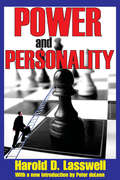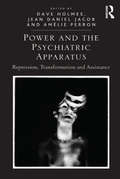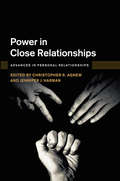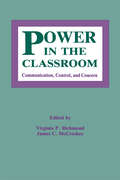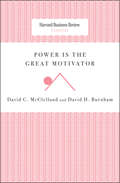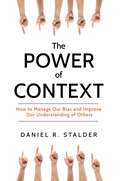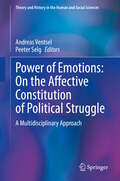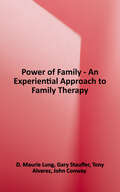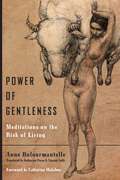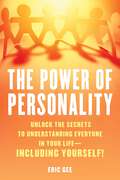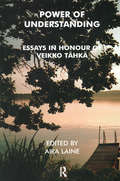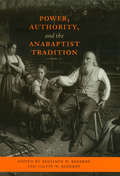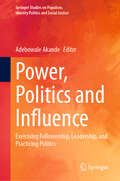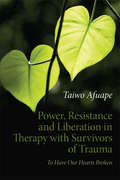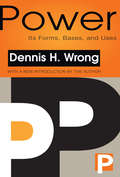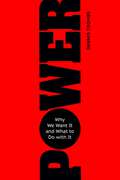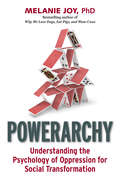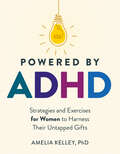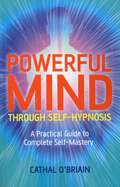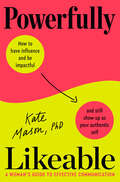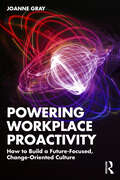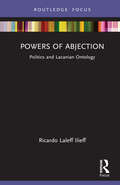- Table View
- List View
Power and Personality
by Harold D. LasswellThis book concerns the wanting, getting, and giving of power. Recent advances in medicine, sociology, and psychology have deepened our understanding of the motives, skills, and experience that operate between leaders and those who are led. Since power is about decision-making, it figures not only in offi cial institutions but in other organizations, including political parties, pressure groups, trade associations, business enterprises, trade unions, and many other types of organizations.A general theory of the political personality is set forth here. Lasswell describes the process by which power becomes a value of first importance and the way appropriate skills in exercising power are acquired. He shows that special political types such as agitators or administrators are related to basic types of character that contribute to how they lead. Finally, his analysis offers original perspectives to understand democratic leadership.Lasswell offers definite suggestions for perfecting self-observatories in national and world affairs and for forming democratic personalities, selecting and training democratic leaders, and reducing destructive conflicts in human relationships. Power and Personality followed the author's 1930 work Psychopathology and Politics, which was widely hailed for its pioneering approach. Power and Personality reevaluated the entire issue of the relationship between psychology and politics in the light of subsequent experience and scientific developments since publication of that earlier work. Lasswell's ideas continue to carry great weight and persuasiveness.
Power and the Psychiatric Apparatus: Repression, Transformation and Assistance
by Dave Holmes Jean Daniel JacobDrawing on a broad range of approaches in the fields of sociology, anthropology, political science, history, philosophy, medicine and nursing, Power and the Psychiatric Apparatus exposes psychiatric practices that are mobilized along the continuum of repression, transformation and assistance. It critically examines taken for granted psychiatric practices both past and current, shedding light on the often political nature of psychiatry and reconceptualizing its central and sensitive issues through the radical theory of figures such as Foucault, Deleuze and Guattari, Goffman, and Szasz. As such, this ground-breaking collection embraces a broad understanding of psychiatric practices and engages the reader in a critical understanding of their effects, challenging the discipline’s altruistic rhetoric of therapy and problematizing the ways in which this is operationalized in practice. A comprehensive exploration of contested psychiatric practices in healthcare settings, this interdisciplinary volume brings together recent scholarship from the US, Canada, the UK, Europe and Australia, to provide a rich array of theoretical tools with which to engage with questions related to psychiatric power, discipline and control, while theorizing their workings in creative and imaginative ways.
Power in Close Relationships (Advances in Personal Relationships)
by Christopher R. Agnew Jennifer J. HarmanPower is an inherent feature of social interactions, yet it is hard to define and therefore understand. This book is the first to organize current interdisciplinary theorizing and research about power from leading academics in areas such as social psychology, communications, family studies, and public health. It also focuses exclusively on how power operates and affects close relationship processes, while the theoretical insights provided point the way toward new lines of research and understanding. Using specific examples to illustrate complex theoretical explanations and supplying thorough descriptions of the existing literature on power in close relationships, this book is an essential resource for researchers, professionals, students, or laypeople seeking to better understand how power operates in those relationships that are most important to us.
Power in the Classroom: Communication, Control, and Concern (Routledge Communication Series)
by Virginia P. Richmond James C. McCroskeyIn the belief that power is something that is negotiated by participants in the instructional process and with the goal of understanding how communication and power interact, this book looks at power and instruction in many different ways. Drawing from the lessons of the social sciences generally, it examines research that has been conducted by instructional communication specialists, looks at newer approaches to power, presents a status report on what is now known, and points to the divergent directions that offer opportunities for future scholarship.
Power is the Great Motivator (Harvard Business Review Classics)
by David C. Mcclelland David H. BurnhamIn this exploration into the nature and value of power in organizations, the authors reveal how the drive for influence is essential to good management. They provide a wealth of counterintuitive insights about what using power really means to foster high morale and a strong sense of responsibility in the workplace.
Power of Context: How to Manage Our Bias and Improve Our Understanding of Others
by Daniel R. StalderA social psychologist focuses on a very common yet rarely discussed bias called the "fundamental attribution error," showing how being aware of this bias can improve our day-to-day understanding of others. Social life involves making judgments about other people. Often these snap judgments turn out to be wrong when we overlook context. Social psychologists call this pervasive bias the "fundamental attribution error." This book explores the many ways in which this error creeps into our social interactions, frequently causing misunderstanding, hurt feelings, and negative treatment of others. Psychologist Daniel R. Stalder examines common examples of this error, from road rage and misinterpreting facial expressions to "gaydar," victim blaming, and prejudice. The common denominator in these diverse examples is that we falsely assume inherent traits or intentions while overlooking situational factors that might explain a person's behavior. Conversely in the actor-observer bias, we explain our own sometimes questionable behaviors by appealing to situational factors. For example, when you tailgate others, there's always a good reason, but when others tailgate you, they are obviously in the wrong. Stalder also reveals little-known information about classic studies of context, considers both the upsides and downsides to bias, and shares numerous strategies to reduce bias. Filled with interesting examples, new insights, and an abundance of research, this informative and entertaining book will help us understand each other and reduce conflict.
Power of Emotions: A Multidisciplinary Approach (Theory and History in the Human and Social Sciences)
by Andreas Ventsel Peeter SelgThe emergence of political identities and communities in (social) media is largely driven by affective responses to current events—a tendency facilitated by the dominance of emotionally and visually oriented communication. However, this mode of community formation leads, first, to the inherent instability and transience of these groups and, second, to the oversimplification of complex socio-political issues into binary, yes/no alternatives. Within this framework, deliberation and argumentation-based problem-solving become increasingly difficult, as discourse is supplanted by emotional reactions that position individuals either &“for&” or &“against&” an issue. Particularly significant is the role of affect and emotion in communication during times of crisis—whether in the context of migration, the COVID-19 pandemic, or the war in Ukraine. This affective role is evident in the anchoring of public discourse to personal emotions and the generation and dissemination of hashtags and tags that consolidate diverse phenomena under a unified label. Such collective identity coalesces around connective action, which is primarily driven either by opposition to the established order or by the reinforcement of a preexisting system&’s foundations. Consequently, the emergence of these affective publics must be analyzed within the broader context of power dynamics and evolving forms of identification in the contemporary media sphere—forms rooted in shared practices of expression, action, and interpretation. This edited volume will explore the manifestations of affective semiosis (meaning-making) at the socio-cultural and discursive levels. Cultural context, emotional reactions, and affective semiosis play a crucial role in shaping how issues related to identity and security are articulated in both domestic and foreign policy, as well as in the ways solutions to these challenges are sought. By adapting the concept of affective semiosis for the analysis of discursive structures, this volume offers an innovative and effective approach to identifying the triggers of emotional reactions in discourse and examining their impact on the construction of political identities, fear scenarios, misinformation campaigns, polarization, and other dynamics within networked societies. The volume includes both theoretically oriented papers as well as analyses of empirical materials.
Power of Family: An Experiential Approach to Family Treatment
by John Conway Gary Stauffer D. Maurie Lung Tony AlvarezThe authors invite you to explore the intentional use of interactive interventions as a primary methodology in family treatment. The activities they introduce into the therapy office provide an immediate context for witnessing how the family functions first-hand. In this manner, families reveal systems, structures, cognitive and emotional processes, strategies, communication styles, approaches to problem-solving, as well as other issues traditionally targeted in the process of family treatment. The intent is to provide an environment that allows family members to freely and genuinely demonstrate their strengths and limitations.
Power of Gentleness: Meditations on the Risk of Living
by Anne DufourmantelleGentleness is an enigma. Taken up in a double movement of welcoming and giving, it appears on the threshold of passages signed off by birth and death. Because it has its degrees of intensity, because it is a symbolic force, and because it has a transformative ability over things and beings, it is a power. The simplicity of gentleness is misleading. It is an active passivity that may become an extraordinary force of symbolic resistance and, as such, become central to both ethics and politics. Gentleness is a force of secret life-giving transformation linked to what the ancients called potentiality.In our day, gentleness is sold to us under its related form of diluted mawkishness. By infantilizing it our era denies it. This is how we try to overcome the high demands of its subtlety—no longer by fighting it, but by enfeebling it. Language itself is therefore perverted: what our society intends to give the human beings that it crushes “gently,” it does in the name of the highest values: happiness, truth, security.From listening to those who come to me and confide their despair, I have heard it expressed in every lived experience. I have felt its force of resistance and its intangible magic. In mediating its relation to the world, it appears that its intelligence carries life, saves and amplifies it.
Power of Personality: Unlock the Secrets to Understanding Everyone in Your Life—Including Yourself!
by Eric GeeConformity is the new black—there is safety in numbers—so what happens when individuals come into conflict with the &“shoe&” values they&’ve been forced to wear from an early age? They will either submit to the pressure and lose sight of themselves or fight like hell and be socially excommunicated. Too often personality distinctions are disowned and labeled as &“weakness&”, or we default to accepting surface differences in the name of &“diversity&”. If we truly want to coexist with one another, we must learn that even our most sacred values deviate from person to person, and it&’s that diversity that makes humanity strong.The Power of Personality demystifies the sixteen different personality types by teaching the reader how to identify and appreciate their own unique type and that of others. By re-examining previously held assumptions on personality (birth order, cultural stereotypes, extroversion vs. introversion, type-A personalities) and debunking/clarifying them, the reader will be able to understand a person deeper than that person understands themselves. Considering the existential threat of our current, fractured sociopolitical climate tearing itself from within, this skill is not a luxury; it&’s a necessity.This is how our species survives:-16 easy-to-remember, animal archetypes. All the fun of zodiac signs and all the empiricism of Joseph Campbell. It&’s for romantics and pragmatists.-An instant conversation centerpiece that everyone can relate to—its ideas were even featured on an episode of Apple TV&’s Mythic Quest. The Power of Personality is the best kind of non-fiction book: one whose subject matter will appeal to all readers because its subject matter is the reader.-A step-by-step guide on how to personality type. Most books consist of a simplistic, often inaccurate, test followed by descriptions and prescriptions. But a treatment can be damaging if the diagnosis is wrong. The Power of Personality is unique in that it trains you to be the test. No more arbitrary questions. No more mistyping. No more damage.-A personal voice that places the reader squarely in the front seat for a breezy, fresh, intellectual joyride that uses humor and pop culture in tandem with the author&’s twenty-plus years of experience in education and life coaching.The Power of Personality is groundbreaking in that it will not only change the way readers see the world but will empower them to reexamine their relationships within it. Gone will be the daze of social disconnect and miscommunication. This book is a must- read, a harbinger of a "Youtopia" where, regardless of whether people are shoes, purses, hats, or polka dot cardigans, everyone is seen, heard, and accepted for who they truly are.
Power of Understanding: Essays in Honour of Veikko Tahka
by Veikko TahkaThis book, published in honour of Veikko Tahka, represents the synthesis of his thinking based on more than forty years' experience as a clinician, researcher, teacher, and supervisor, concerning the nature of understanding, a debate in which the psychoanalytic model was used as an example.
Power, Authority, and the Anabaptist Tradition (Center Books in Anabaptist Studies)
by Benjamin W. Redekop and Calvin W. RedekopFounded in part on a rejection of "worldly" power and the use of force, Anabaptism carried with it the promise of redemptive power. Yet the attempt to banish worldly power to the margins of the Christian community has been fraught with dilemmas, contradictions, and, at times, blatant abuses of authority. In this groundbreaking book, Benjamin W. Redekop, Calvin W. Redekop, and their coauthors draw on classic and contemporary thinking to confront the issue of power and authority in the Anabaptist-Mennonite community. From the power relationships of the sixteenth-century Peasants' War to issues of contemporary sexuality, the topics of Power, Authority, and the Anabaptist Tradition are sure to interest a wide audience.Contributors: Stephen C. Ainlay, College of the Holy Cross • J. Lawrence Burkholder, President Emeritus, Goshen College • Lydia Neufeld Harder, Toronto School of Theology • Joel Hartman, University of Missouri • Jacob A. Loewen, missionary, retired • Dorothy Yoder Nyce, Writer and former Assistant Professor, Goshen College • Lynda Nyce, Bluffton College • Wesley Prieb (deceased), former dean, Tabor College • Benjamin W. Redekop, Kettering University • Calvin W. Redekop, Conrad Grebel College, emeritus • James M. Stayer, Queen's University, Ontario
Power, Politics and Influence: Exercising Followership, Leadership, and Practicing Politics (Springer Studies on Populism, Identity Politics and Social Justice)
by Adebowale AkandeThis book comprehensively explores the foundational principles of power, influence, and organizational politics, presenting actionable approaches for both employees and management to skillfully navigate these intricacies without succumbing to undue incivility, stress, or burnout. Power, as an imperceptible yet influential entity within organizations, steers the trajectory of decisions, behaviors, and the dynamic interplay between leaders and their teams. This book examines leadership theory and practice, offering a unique perspective on leadership styles, behaviors, and traits. In today's dynamic landscape, leadership capability and skill are important across sectors, influencing organizational health, political landscapes, and societal development. The book presents the challenges modern leaders face and how leadership theory can enrich workplace dynamics and beyond. Bridging the gap between academic research and practice, this volume offers guidance for aspiring and experienced leaders alike. From political skill to organizational culture, this book examines leadership from a multidisciplinary perspective. Scholars, students, and researchers of political science, business, management, economics, international relations, and psychology, as well as consultants, policymakers, and leaders interested in a better understanding of effective leadership concepts and the latest research in politics, policy, and participation in any setting, will find this resource invaluable.
Power, Politics, and Paranoia
by Jan-Willem van Prooijen Paul A. M. van LangePowerful societal leaders - such as politicians and Chief Executives - are frequently met with substantial distrust by the public. But why are people so suspicious of their leaders? One possibility is that 'power corrupts', and therefore people are right in their reservations. Indeed, there are numerous examples of unethical leadership, even at the highest level, as the Watergate and Enron scandals clearly illustrate. Another possibility is that people are unjustifiably paranoid, as underscored by some of the rather far-fetched conspiracy theories that are endorsed by a surprisingly large portion of citizens. Are societal power holders more likely than the average citizen to display unethical behaviour? How do people generally think and feel about politicians? How do paranoia and conspiracy beliefs about societal power holders originate? In this book, prominent scholars address these intriguing questions and illuminate the many facets of the relations between power, politics and paranoia.
Power, Powerlessness and Addiction
by Jim OrfordAddiction exercises enormous power over all those who are touched by it. This book argues that power and powerlessness have been neglected in addiction studies and that they are a unifying theme that brings together different areas of research from the field including the disempowering nature of addiction; effects on family, community and the workplace; epidemiological and ethnographic work; studies of the legal and illegal supply, and theories of treatment and change. Examples of alcohol, drug and gambling addiction are used to discuss the evidence that addiction is most disempowering where social resources to resist it are weakest; the ways in which the dominant discourses about addictive behaviour encourage the attributing of responsibility for addiction to individuals and divert attention from the powerful who benefit from addiction; and the ways in which the voices of those whose interests are least well served by addiction are silenced.
Power, Resistance and Liberation in Therapy with Survivors of Trauma: To Have Our Hearts Broken
by Taiwo AfuapeThis book offers reflections on how liberation might be experienced by clients as a result of the therapeutic relationship. It explores how power and resistance might be most effectively and ethically understood and utilised in clinical practice with survivors of trauma. Power, Resistance and Liberation in Therapy with Survivors of Trauma draws together narrative therapy, Coordinated Management of Meaning (CMM) and liberation psychology approaches. It critically reviews each approach and demonstrates what each contributes to the other as well as how to draw them together in a coherent way. The book presents: an original take on CMM through the lenses of power and resistance a new way of thinking about resistance in life and therapy, using the metaphor of creativity numerous case examples to support strong theory-practice links. Through the exploration of power, resistance and liberation in therapy, this book presents innovative ways of conceptualising these issues. As such it will be of interest to anyone in the mental health fields of therapy, counselling, social work or critical psychology, regardless of their preferred model. It will also appeal to those interested in a socio-political contextual analysis of complex human experience.
Power: Its Forms, Bases and Uses (Key Concepts In The Social Sciences Ser.)
by Dennis WrongIn one grand effort, this is an anatomy of power, a history of the ways in which it has been defined, and a study of its forms (force, manipulation, authority, and persuasion), its bases (individual and collective resources, political mobilization), and its uses. The issues that Dennis Wrong addresses range from the philosophical and ethical to the psychological and political. Much of the work is punctuated with careful examples from history. While the author illuminates his discussion with references to Weber, Marx, Freud, Plato, Dostoevsky, Orwell, Hobbes, Arendt, and Machiavelli, he keeps his arguments grounded in contemporary practical issues, such as class conflicts, multi-party politics, and parent-child relationships.In his new introduction, prepared for the 1995 edition of Power, the author reconsiders the concept of power, now locating it in the broader traditions of the social sciences rather than as a series of actions and actors within the sociological tradition. As a result. Wrong emphasizes such major distinctions as "power over" and "power to," and various conflations of power as commonly used. The new opening provides the reader with a deeper appreciation of the non-reductionist character of the book as a whole.
Power: Why We Want It and What to Do with It
by Dennis ToombsThis book explores human behavior in terms of power in all its manifestations across a wide spectrum. The author examines the subtle dynamics of power in interpersonal relationships as well as its overarching influence in large institutions such as governments, nations, and the financial centers of our global economy. By using this single conceptual lens, he demonstrates how abundant and diverse our power sources are, how to find and develop them to unleash our hidden potential, and how to help others accomplish the same. What are the three (or four) greatest sources of individual power? How do we use power passively and aggressively in relationships? Why does power tend to corrupt? What influence does government have on the distribution of wealth? In what ways have globalization and technology changed our national economies, corporations, and governments? How can we promote the common good for ourselves and society? These questions and more are illuminated through the author's insightful focus on power broadly defined. After reading this book, you'll never see yourself or the world again in quite the same way.
Powerarchy: Understanding the Psychology of Oppression for Social Transformation
by Melanie JoyHarvard-educated psychologist and bestselling author Melanie Joy exposes the psychology that underlies all forms of oppression and abuse and the belief system that gives rise to this psychology—which she calls powerarchy. Melanie Joy had long been curious as to why people who were opposed to one or more forms of oppression—such as racism, sexism, speciesism, and so forth—often stayed mired in many others. She also wondered why people who were working toward social justice sometimes engaged in interpersonal dynamics that were unjust. Or why people who valued freedom and democracy might nevertheless vote and act against these values. Where was the disconnect?In this thought-provoking analysis, Joy explains how we've all been deeply conditioned by the invisible system of powerarchy to believe in a hierarchy of moral worth—to view some individuals and groups as either more or less worthy of moral consideration—and to treat them accordingly. Powerarchy conditions us to engage in power dynamics that violate integrity and harm dignity, and it creates unjust power imbalances among social groups and between individuals. Joy describes how powerarchies—both social and interpersonal—perpetuate themselves through cognitive distortions, such as denial and justification; narratives that reinforce the belief in a hierarchy of moral worth; and privileges that are granted to some and not others. She also provides tools for transformation. By illuminating powerarchy and the psychology it creates, Joy helps us to work more fully toward transformation for ourselves, others, and our world.
Powered by ADHD: Strategies and Exercises for Women to Harness Their Untapped Gifts
by Amelia KelleyPractical strategies and exercises that empower women with ADHD to use their gifts for everyday successBacked by the latest research on the benefits that exist with having ADHD, Powered by ADHD is a practical road map for women to take charge and harness their enormous strengths and talents. With more than 20 years of experience working with neurodivergence, Dr. Amelia Kelley offers guidance, skills, and tools that emphasize flexibility and self-compassion to help women develop a positive self-image and see immediate results in all areas of life. Powered by ADHD features: A complete package for women with ADHD—grounded in the latest science and research; positive and motivating support; practical guides, tools, and strategies Practical guidelines to the top ADHD gifts, including how to effectively use these strengths to meet productivity and accomplish goals Real-life adult ADHD challenges and clear strategic solutions for key areas of a woman&’s life—work, home, relationships, finance, motherhood/caretaking, and more Step-by-step and easy-to-follow exercises that are designed to work with and for the ADHD brain
Powerful Mind Through Self-Hypnosis: A Practical Guide to Complete Self-Mastery
by Cathal O'BrianPowerful Mind Through Self-Hypnosis is a practical, easy to follow guide to harnessing the power of your subconscious mind for better health. This book will literally change the way you think, feel, act and behave...forever. Clinical Hypnotherapist and Psychotherapist Cathal O'Briain will help you overcome emotional and psychological difficulties through self-hypnotic trance. Symptoms will become a thing of the past as your life transforms, taking you beyond the comfort zone into a world of inner peace and freedom, happiness and success.
Powerfully Likeable: A Woman's Guide to Effective Communication
by Kate Mason PhDA groundbreaking new roadmap for female success—how to be influential, respected, and well-liked at work, at home, and beyond—from a leading business coach and communication expert.&“The competence-likeability bias is an absurd catch-22, but never fear! In this compelling, compassionate, and funny read, Kate Mason shows you how to break free.&”—Kim Scott, author of the New York Times bestseller Radical CandorWomen all over the world struggle to communicate with authority yet still be liked by a crowd. We strategize before meetings, second-guess in bathroom stalls, text outfit options to our best friends, and try to anticipate every possible variable. This tricky business is what world-champion debater and executive coach Kate Mason calls &“communicating while female&” and, frankly, it seems like it&’s impossible to get it right.Until now. In Powerfully Likeable, Mason explains that being influential and well-liked is not an either/or proposition. Furthermore, she shows that women don&’t have to imitate what men do; gaining respect doesn&’t mean having the loudest voice or the firmest handshake. Instead, the key is to choose communication tools that amplify what makes you unique—whether that be warmth, humor, competitiveness, or a love of data—and wield your power from a place of authenticity. From personal presentation style and negotiation to handling adversarial conversations and becoming your own best advocate, Mason offers a game-changing tool kit of strategies, including• scripts for owning your accomplishments instead of downplaying them and defending your ideas without being defensive• methods for using clear logic, evidence, and debate strategies to ask and answer clear questions without appearing &“difficult&”• tips for overcoming &“Imposing Syndrome&”—the disease of playing small and not taking up space—and channeling warmth as an alternative to deference in conversation• techniques to regulate your body language, voice, and words to find your true communicative powerA paradigm-shifting guide to dismantling and thinking beyond stereotypes, Powerfully Likeable will help you unleash your creative power and energy and embark on a journey of success on your terms.
Powering Workplace Proactivity: How to Build a Future-Focused, Change-Oriented Culture
by Joanne GrayEmpowering, customizable, and backed by organizational research, this book introduces the PROACTIVE work design model and diagnostic tool to help organizations create optimal conditions for proactivity at work to flourish.The pressures and expectations of 21st-century life have led to short-term, reactive behavior in the workplace, however, long-term business success relies on proactive behavior, which is self-directed, future-focused, and change-orientated. But proactivity does not occur in a vacuum – it is a complex, social process heavily affected by contextual and situational factors. With its distinct and flexible design model, this book solves the problem of ‘how’ to create the optimal conditions for proactivity at work to flourish, and to drive sustainability and competitive advantage. And its diagnostic feature recognizes that readers are time-pressured and may already be doing some things well within their organizations, so it offers a solution to their problems without having to read the entire book before they can start making a difference. Uniquely, this book recognizes how important it is for leaders to shape the work environment and to be a positive role model to stimulate employee proactive behavior.Intended as a practical resource, this book provides a range of evidence-based tools and techniques and includes insightful case studies that will be useful for leaders, managers, HR professionals, OD practitioners, and consultants who want to drive proactive behaviors within their organizations.
Powers Of Horror: An Essay on Abjection
by Julia Kristeva Leon S. RoudiezPowers of Horror is an excellent introduction to an aspect of contemporary French literature which has been allowed to become somewhat neglected in the current emphasis on para-philosophical modes of discourse.
Powers of Abjection: Politics and Lacanian Ontology (Psychoanalytic Political Theory)
by Ricardo Laleff IlieffIn this book, Ricardo Laleff Ilieff presents a new ontological understanding of politics through the writings of Julia Kristeva’s notion of “abjection” in dialogue with Sigmund Freud’s concept of “Unheimlich” and Jacques Lacan’s ontology “du rél”.Aimed at those who are interested in the politics-psychoanalytic “praxis”, Laleff Ilieff argues that the abject enables one to critically read conceptual developments that are central to contemporary thought. Examining the abject in sacrifice, war, and the One as articulated by contemporary thinkers such as Walter Benjamin, Judith Butler, Carl Schmitt, RenéGirard, Pierre Clastres, Giorgio Agamben, and Jacques Rancièe, Laleff Ilieff argues that abjection does not operate on the margins of the social but is what unveils the failure of all identity.Powers of Abjection provides new questions and insights into the relation between psychoanalysis and politics and is an invaluable resource to students and scholars.
